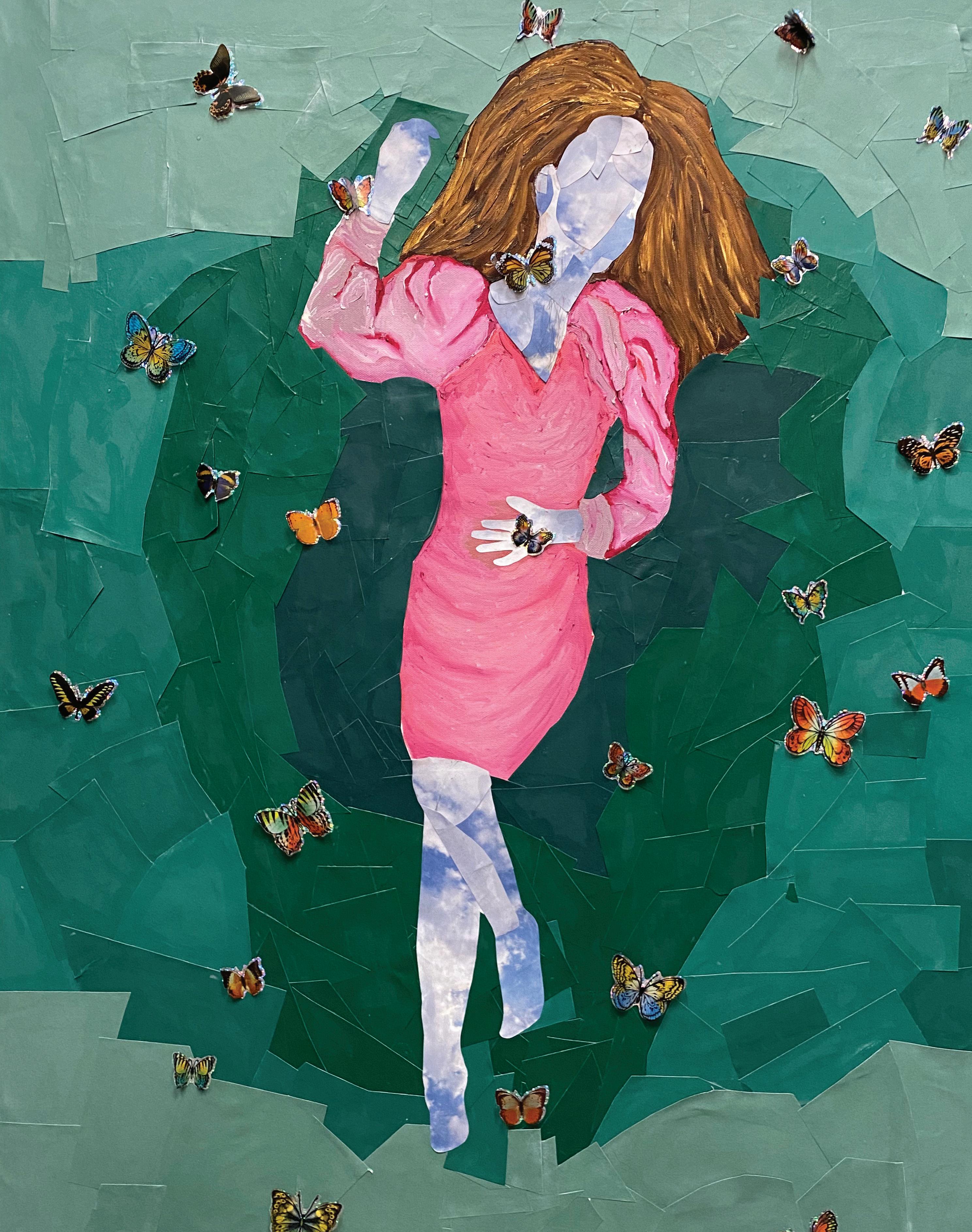
10 minute read
Rejection: the Good, the Bad, and the Ugly
Chena Williams
Interview
Advertisement
Majoring in the arts is often referred to as a shot in the dark. Writers and artists often face a lack of motivation and many rejections. I wanted to sit down with someone who could provide more insight about entering the creative world and handling rejection as a professional. MSU Denver English professor, screenwriter, and author of Animal Rights & Pornography, Dr. J. Eric Miller talks about his path to publication and why rejection may be the thing writers need in order to succeed.
Photo provided by Dr. Jason E. Miller

Do you think you could tell me more about what rejection looked like for you?
Yeah, I can tell you lots about rejection! I was writing from when I was about ten years old. I got inspired. And by the time I was twelve, I got a typewriter. So, I was sending stuff out. By the time I was twelve years old, I was submitting. Every Christmas I would get a copy from my parents of The Writer's Market, and I would use that, and I got nothing but rejections[…]
Everything around it was “no thank you, no thank you, no thank you.” You started eating “no thank yous” like potato chips. If you want to be successful, you have to. I have gotten hundreds and hundreds of rejection letters, and there's another hundred where you didn't even hear back from them, which is another rejection. Animal Rights and Pornography, I sent it to three places, and one of them took it. That's an amazing, rare accident of how everything lined up. They had the right people there to like the kind of stories I was doing in that book. They had one person there that didn't, and this person needed to talk to me. They were uncomfortable with the material. So even then, there was a chance of rejection.
Rejection has been so much. Especially at this point in history that I tend not to send things out at all just because I don't think the market’s there. That's not to say all of you shouldn’t. It's just that I don't have the energy for it. […] There are still plenty of markets. Young writers should be sending stuff out. They should be papering in their walls with rejections. They should remember, Moby Dick went to every publisher in the country. You gotta get lucky, and you gotta be persistent. Persistence usually causes a lucky thing to happen. Emotionally with rejection, I just never took it all that seriously. At a certain point, you might send a piece out, you might be like, wow, this piece just must not be good. Maybe that's true, and maybe it isn't. That’s the emotional cost of rejection. By the time you get the first twenty of them, you're just not that emotionally invested. You’re just going to be so happy when something pops.
Was rejection dampening your inspiration to continue writing?
No, not at all! Because I've gotten lucky, and I knew what success was like. I felt like rejection was just part of the game. I'll tell everybody this in every class: if you've written a decent piece, and you're willing to keep trying to send it out. Eventually, it will make it into the world. I've always believed that. After The Entertainer put a story out [about my work] I said, “This will happen to me again.” And it did. It always happened.
Did you have friends and family who encouraged you to continue at the time?
No. I’d say my father was very much against me going to school for English or any of that stuff. He's probably okay with it now because it turned into a job. People always knew you weren't going to make it as a big-time writer. The encouragement was never really there. I never really needed it I suppose. Then you get into school, and you run around with a bunch of youngsters that are very gung-ho like you are. I guess in that way, you're encouraged by friends. Y'all kind of encourage each other.
Since you are a professor at MSU Denver, how has teaching changed your writing process?
The number one thing is if you're going to give the students what they deserve, what they paid for, and what you're getting paid to give them, it's gonna cost you. The price is high, and I'm not trying to be martyred. It's just by the time we're halfway through a semester, I start getting exhausted. Imagine in a class—like a fiction writing workshop— you've got twenty-four people that are all going to write significant work. Every one of them needs something from you that's pretty heavy to give.
To read is its own art—to try to understand what somebody is up to in any piece that they write. I have to try to understand. I might not always get it. I might fail the student, but I'm trying with everybody. Then, I've got to articulate something that I believe will be useful. I might not get it all the time, but I try. That trying is emotional and psychological energy. You need that to write with.
At the same time, what I've learned to teach, I didn't learn in graduate school. I learned it from going out and being a professor. I'm twenty years being a professor and then three years before that being a TA in graduate school. What I've learned from that is that the number one thing I teach is being more purposeful in our writing. That has changed my writing process. I'm more purposeful. Having a talk instead of just feeling my way through character development from the standpoint of a professor and trying to give the students a few nuggets that might make them purposefully craft their characters causes me to do the same thing.
Every time I teach a class, it's going to be a little different. I'm going to have added on and changed a little bit of what I say because you're always developing. All of those developments are affecting my own writing, too, So, that's the bonus. I'm a better writer than I would have ever been because I have been a teacher. Once you try to teach something, you have to think about how it's done. I've taken classes from real successful writers. They can't teach because they don't know how they do what they do or they don't want to try to articulate it, Then, they don't make it accessible. I'm not trying to say that I'm a great teacher, but I learned a lot from teachers that didn't really know or care enough to want to teach. You really have to care. You have to have a sense of shame and guilt to give your students what they deserve. I believe that.
What do you see students struggle with the most in any of the classes that you've taught?
Theme. Theme is tough for students. It's tough for everybody because it's
hard to talk about. It's hard to pinpoint, and it's hard to develop. The truth is most of the models that you have, as students that you're really into, are thematically barren. I'm watching Game of Thrones right now, and it's great. It's very entertaining, but it could have been written by a computer. What we're not going to get AI to do for a long time is the stuff that happens to us on a subconscious level. The
real art is going to come from your subconscious. Theme comes from the subconscious. Deep thematic development is the most beautiful thing in writing. The pieces in the end that will really hit us as we mature are those pieces that have deep thematic development. That's hard to teach.
The models aren't really there. Coming up with theme that relates directly to who you are and what the world has made you, your desire to challenge yourself mentally, your belief systems, who you think you are—when you start doing that, you're doing work that allows you to eventually be thematically deep in your work. But the place that we live in right now, as a world, does not encourage those kinds of questions. We're taught to think in black-andwhite terms. You know, we're taught by the politics in this country to get rah-rah about one thing or the other. We miss the middle ground, and you know, that's where theme comes from.
How do you know when to reject a critique?
It's tough, especially when you're a student because the truth is most of us take workshops at that stage. The sad truth is most of us take it not to grow as writers, but because we want that feedback. Of course, then, we want it to be positive. You're in class because you
want applause. It's going to sting. I really try to make sure that we're doing about half of what's working and half of what's not. I think what's not working is going to stand out.
We never go through a workshop semester where somebody doesn't end up crying. It's emotionally raw. Our stories feel like extensions of ourselves. As much as we say, “I know there's some problems, ”we're surprised and hurt always. My best advice for how to avoid being too hurt by it is to put it aside. Totally ignore it. Do your other classes, watch Game of Thrones, go throw frisbees. Then about three, four days later, come back and don't look at that stuff. Just sit in front of your computer, and you say, “Okay, I need to rework the story to a certain extent, what stuck in my brain from workshop?”
Those things that stick in your brain are like gold at the bottom of the gold pan. Your subconscious has kept 61
them for a reason […] So that's my advice. We shake all the dirt out, and what's left is gold. What you most want to hear in workshop, you should reject. That person's just a fan. What you most don't want to hear, pay some attention to it. There might be something there.
What is the best advice that you could give to a young writer who is struggling with motivation or a writer who is struggling with the publication process?
Persistence. If you're not motivated to send stuff out, I get it. But if you want to be a writer, you want your stuff in the world. People who don't even know what you look like, they're reading your work, they know your name, but you don't know theirs—that's what you want as a writer. So, send it out. Send it out. Send it out. Write your blog, but don't write stories for your blog. Write stuff that's going to get bedded […] Have ten things you're sending out at any given time. When a piece is done, there's a point where you have to step back and say, “This is what it is. I'm done.” When you're done, send it out. Be persistent.
It's a lottery. If your chances of winning anything in the lottery is one in one hundred, then you bought one hundred tickets. You're guaranteed to win. Now, of course, how the lottery works, you might have won five bucks, and you spent a hundred, but you're guaranteed to win.
When it gets published, the reward is not the money. It is knowing that people are reading, feeling, and thinking things on account of you. Once it's out there, usually you will hear a few things. You get a little fan email or something. That's it. That's why you do the work. When you know that they have you, you will feel fulfilled. You will feel self-actualized, you will be addicted, and you will never want to stop.








